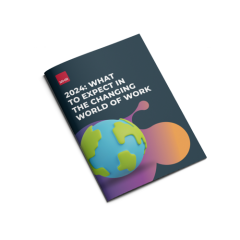What will payroll look like in 2024?

Prepare your payroll function for 2024 with this guide to upcoming industry developments.
“We can see which way the wind is blowing, but how fast is it going?”- Mat Akrigg
Payroll departments are facing a lot of game changing challenges at the moment, which are expected to come to a head in 2024.
“Knowledge and subject matter expertise are the big issues,” says Camilla King, Senior Product Manager at MHR. “With the volume of changes that have occurred over the past few years, along with experienced members of the payroll community retiring at an accelerated rate during the pandemic there is a big knowledge gap in some organisations leaving them vulnerable to fines for not meeting legislative compliance.”
Neil Tonks, Senior Product Manager at MHR adds “Remaining compliant with ever-changing legislation is a big challenge common to all payroll operations. In the present economic climate, employee financial wellbeing can be a challenge depending on the attitude of the employer.”
Since the Great Resignation, a lot of departments have been struggling with talent gaps, but this is especially pronounced in payroll teams. They’re so reliant on knowledge (in regard to processes and compliance particularly) that skill gaps aren’t just problematic, they can be crippling. Finding ways to overcome this will be the major trend of 2024.
Payroll departments also tend to struggle with modernisation. Often seen as a purely administrative or bookkeeping role, payroll teams don’t often get the tech investment other departments see. That makes those skill gaps an even bigger issue, as upgraded technology can smooth over the missing gaps.
“Digitisation is coming.” Says Mat Akrigg, Policy and Research Officer at CIPP. “HMRC has made it clear they are moving to a more technological approach, with multiple consultations and interactions indicating so. What this means in the long run, we don’t know, HMRC is quite understandably risk adverse in many respects and so large changes will take time. But with their new focus on tax simplification, HMRC are setting their sights on a cohesive tax system that works for a digital world.”
The real-time key
Organisations waste up to 75 hours per pay cycle on manual processes
“Real-time payroll gives you the ability to be proactive rather than rushed with the payroll cycle.”- Camilla King
“Good payroll software will take care of much of the legislative stuff, though the users still need some knowledge as no system can do it all.”- Neil Tonks
No matter what problems a payroll team might be facing, real-time payroll is a key solution. It has proven to be a massive success for the organisations that have implemented it, overcoming a lot of problems that have plagued payroll departments for years, while also unlocking new ways of handling new requirements.
Real-time payroll is an automatic process where payroll calculations are made as soon as changes are made to data, and you can see how changes are impacting your payroll straight away.
That removes a huge number of issues. Payroll has historically been a process with a lot of stressful peaks and troughs. Things get locked in place, and any errors that crop up are often not spotted until it’s too late.
Real-time payroll removes all those concerns. “Not only does this streamline processes, but it also means it is easier to spot errors, increases accuracy and improves visibility without adding to your payroll team’s workload,” says Smith.
Final thoughts
This blog is part of a wider six part series, all about the challenges and opportunities the changing world of work will have to deal with in the coming year.
Want to get even more details? Check out the other blogs in the series and download the full 2024 guide to get the complete picture about payroll, including flexible pay, financial wellbeing and the move to the cloud.
Whether you’re interested in HR, payroll, finance, learning, data analytics or tech, we’ll help you build a complete roadmap that helps your organisation adapt and thrive.



